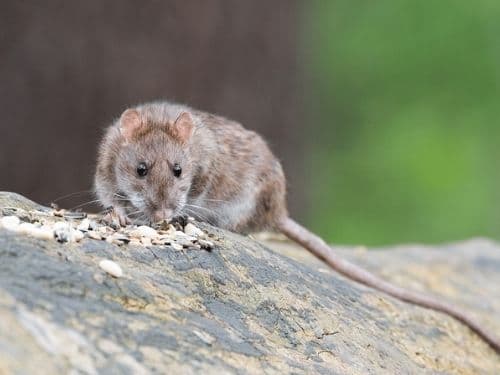Finding rat feces and urine around your home is one of the most horrifying sights (and quite possibly, smells) that will have you in a panic. Is this rat feces and urine going to cause a danger to the health of you and your family? What type of danger does it pose? How can you be sure to keep yourself safe when coming in contact with it? And most importantly, how can you get rid of them? These are all things that you may be wondering about from the second you discover rat droppings in your home. Here is everything you need to know about the dangers of rat urine and feces. Call our rat exterminator Kitchener services.
What Makes It Dangerous?
Rats are repulsive pests that are known to carry different diseases and viruses that can cause a serious health threat to humans. There’s no easy way to tell if a rat is infected with a specific virus, either. Which makes it even more important for you to understand the dangers and how to properly protect yourself and your family. The biggest threat to humans is the Hantavirus that is spread from rodents through their feces and urine. Once the feces has dried, it can easily be crumbled and turn into airborne dust. This dust is then breathed in by humans and can infect the individual simply through breathing. Hantavirus isn’t the only illness that can be transferred from rodents to humans, but it is one of the main health concerns.
In addition, these droppings from rats can also contribute to severe allergy symptoms and asthma attacks. Just as humans can be allergic to mould or dust, they can also become allergic to the droppings left behind from rats and other rodents. As rats leave behind trails of urine, they become capable of contaminating your food and water sources by trailing these droppings throughout your home. As you can see, there is plenty to fear for when dealing with rat feces and urine – especially if you are unaware of whether or not the rat is infected with Hantavirus (and in most cases, you will never know until it’s too late). It’s crucial that you take all precautionary measures to ensure the safety of you and your family when it comes to handling rat droppings to prevent any serious health threat.
How Can You Protect Your Family?
While there can be a dangerous risk when dealing with rat feces and urine, you can definitely lower the risk by ensuring you are handling the droppings safely when you dispose of them. The best way to do this is to not handle it at all and hire a professional instead. However, that may not always be possible. Before you attempt any cleanup, be sure that the rats have been trapped and all entryways are sealed. This will help ensure that no more rodents can get inside of your home while you are managing the cleanup.
Here are a few steps that you can take to safely clean up rat feces and urine if you must do it yourself:
- Always use rubber, vinyl, or latex gloves when cleaning the droppings.
- Do not sweep or vacuum the mess, as this will create dust in the air that may contain hazardous particles.
- Spray the urine spots with a disinfectant and allow them to soak. If you are using a designated product, be sure to follow the instructions entirely to allow enough time for the disinfectant to work.
- Use a paper towel to clean the urine and feces and be sure to dispose of them properly.
- Once the mess is thoroughly cleaned, continue to disinfect the surrounding area using bleach or a designated disinfectant. Clean all surfaces that may have been contaminated with droppings.
The best way to protect you and your family from potentially toxic rat feces and urine is to hire a professional to clean the droppings. Our professional pest control Kitchener and the cleanup team can help you manage the mess in a safe and effective way. They will use the best strategy and equipment to protect the health of you and your family. This will ensure that you and your family are safe and away from any droppings and dust particles that may contaminate the air during the cleanup process.

